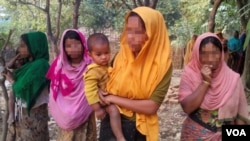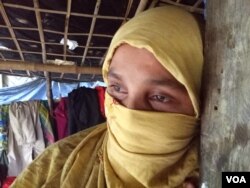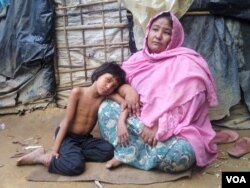Rohingya Muslim villagers who spoke to a group of visiting reporters in Myanmar's Rakhine state have been harassed and, in at least one case, murdered. Government and Rohingya advocates are offering conflicting accounts of who is responsible.
The body of one of the men who spoke to reporters was found headless in a river, while others fled to neighboring Bangladesh. One woman told VOA by telephone from Bangladesh that she feared for her life after telling the visiting journalists reporters that she had been raped by soldiers.
The invitation-only media tour, comprising mainly journalists from Myanmar-based publications, marked the first time reporters had been allowed into the region in Rakhine state since three police posts came under attack on Oct. 9, leaving nine border guards dead.
Human rights groups accused the Myanmar military of responding with excessive force, and released satellite photos to support their claims that several Rohingya villages were burned to the ground. Soldiers are also accused of rapes, killings and other abuses that prompted thousands of Rohingya to flee to Bangladesh. Myanmar authorities reject the charges.
The reporters, who were escorted by government officials to selected villages last week, were unable to confirm most of the complaints. At least two women told the reporters that they had been raped.
Reporters for Western media outlets protested at being left out of the tour and suggested the trip had been set up for "show." Information Ministry spokesman Ye Naing told VOA the trip had been hastily arranged but that the journalists were given free rein to report whatever they saw and heard.
Reports of retaliation against villagers who spoke to the reporters emerged immediately after the tour. On Dec. 22, authorities announced the discovery of the body of Dus Mohammad, a 39-year-old volunteer librarian also known as Shuna Mia. His severed head was found nearby.
Reports said the man had told reporters that more than 1,000 people had fled his village in response to the military deployment, but that Dus Mohammad had denied many of the allegations against the soldiers.
A posting on the Facebook page of Myanmar's de-facto leader, Aung San Suu Kyi, said Dus Mohammad "told media that there was no case of arson by the military and police forces, no rape and no unjust arrests." Local media speculated that he may have been killed by Rohingya militants angered by his denials.
Nurul Islam, the Britain-based chairman of a Rohingya advocacy group, strongly challenged that idea, saying his Arakan Rohingya National Organization has been told by villagers who were present that Dus Mohammad said nothing to anger other Rohingya.
He said his group has been told that groups of Rakhines -- members of the Buddhist majority ethnic group in the state -- have joined the military in attacking Rohingya villages.
"We have strong reasons to believe that the armed Rakhines...carried out this murder," he said in a telephone interview.
Other Rohingya activists told VOA that the discovery of Dus Mohammad's body prompted other villagers who had criticized the soldiers during the press tour to go into hiding or flee to Bangladesh.
Noor Jahan, a 27-year-old widow, told VOA by telephone that she had received serious threats after telling the visiting journalists on Dec. 21 that she had been raped. She said she and her 6-year-old daughter crossed into Bangladesh three days later.
"Five soldiers and Mogh [Buddhist] men had entered my house and they all raped me one by one and I fell unconscious," Jahan said. "I told the journalists how I had been raped and tortured by the soldiers and the Mogh men. Many other Rohingyas too reported to the media about rapes, killings and torture by the soldiers."
"After Shuna Mia was found slaughtered and when the soldiers and police launched a search for me, I became sure I would be killed," Jahan added. "Fearing for my life, I have fled to another country now."
Burmese reporters who participated in the media tour confirmed to VOA that they spoke to Noor Jahan and another woman, Jamah Leha, who described being dragged into a forest and raped. The reporters, however, said the claims were inconsistent and they were seeking more confirmation before reporting on the women's complaints.
The government says it later sent investigators to the village to follow up on the women's stories and take appropriate action, but that the women had disappeared. Rohingya activists say the women went into hiding because they believed the officials were going to retaliate against them.
Ko Ko Linn, a Bangladesh-based Rohingya community leader, said in a telephone interview that many Rohingya villagers held back during the press tour because they did not trust the Burmese reporters.
"They feared if they told the journalists that the soldiers and the Rakhines were the perpetrators of the violence, it would surely trigger fierce reprisals from them afterward," he said.
Human Rights Watch has estimated that 1,500 buildings have been burned since the Myanmar military deployed to the area following the attacks on the police posts. The United Nations says 30,000 people have been left homeless and 27,000 have fled to Bangladesh.
The International Crisis Group, an independent foreign affairs monitoring group, said in a report this month that the attack on the police stations appears to have been the work of an emerging militant group that is "led by a committee of Rohingya emigres in Saudi Arabia and is commanded on the ground by Rohingya with international training and experience in modern guerrilla war tactics."
It said the well-funded and well-organized group, which refers to itself as Harakah al-Yaqin (aith Movement, Hay), arose in response to longstanding discrimination against Muslims in Myanmar and warned that a failure by the military to distinguish between militants and civilians will only make matters worse.
Joe Freeman and VOA's Burmese and Bangla services contributed to this report.






